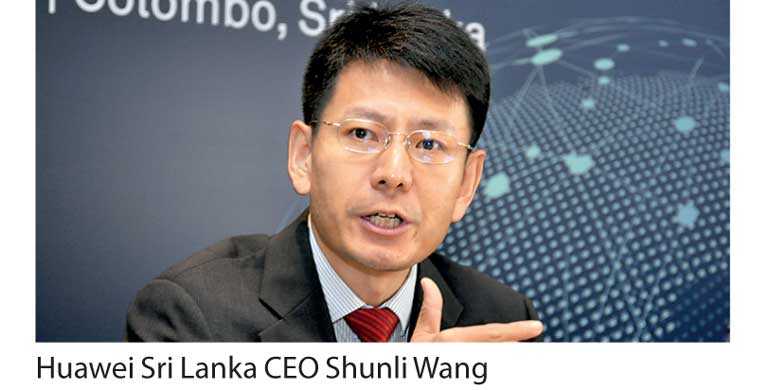Wednesday Feb 18, 2026
Wednesday Feb 18, 2026
Wednesday, 17 October 2018 00:00 - - {{hitsCtrl.values.hits}}

By Charumini de Silva
Huawei, the leading global provider of ICT infrastructure and smart devices, yesterday said it hoped to increase investments in the home broadband sector in Sri Lanka to reach over 1.5 million households in the next few years.
Reiterating its commitment to providing better connectivity, Huawei Sri Lanka CEO Shunli Wang said the company was keen on supporting the country to introduce the latest technology at affordable prices to empower citizens to contribute to economic growth.
“We want to develop broadband connectivity in Sri Lanka. At the moment there are over five million households in the country but broadband penetration is only 20% or one million families. We want to invest in this area to increase it from 20% to 50% in the next few years,” he told journalists on the sidelines of the Asia-Pacific WTTx Summit titled ‘Bridge Digital Divide, Accelerate Broadband to Household’ organised by GTI Informa and Huawei yesterday in Colombo.
He revealed that its strategy to provide better connectivity to Sri Lanka had not changed since Huawei entered the market in 2012.
Refusing to disclose a financial commitment for this endeavour, Wang said the company had continued to invest in training young talent annually, sharing global experiences and aftersales service with faster deployment.
Noting that home broadband connections in Sri Lanka had expanded three times over the recent past, he nevertheless said that there was a lot of room for improvement in terms of developing infrastructure in the industry compared to other regional countries.
“Although Sri Lanka is a potential market, it currently lacks ICT infrastructure compared to other countries in the world. But from the Government, operator and consumer sides everyone is doing their best to make that contribution to the growth of the entire ICT industry,” he added.
In terms of developing the whole ecosystem, Wang suggested the Government should also have some obligation in terms of encouraging the entire industry to develop broadband connectivity in all households in Sri Lanka through favourable policy and spectrum alignment with operators as well as considering affordable prices.
Acknowledging that regulatory barriers were challenging, he highlighted the importance of greater engagement with all stakeholders of the industry. “It needs time, it needs experience and that is why the WTTx Summit is important for Sri Lanka,” he stated. Wang said no company would merely invest on its own to develop rural connectivity, adding that it should rather be a priority on the Government’s agenda.
“Unless the Government can give priority to develop ICT infrastructure through its agenda coupled with enabling policies, no one will invest to improve rural connectivity,” he pointed out.
He also noted that with over 50% of the country’s population still using feature phones, it was unrealistic to talk about a digital transformation, with many still lacking awareness.
“Digital transformation has now become a trend in the world. Everyone talks about it, but in Sri Lanka, almost 50% of people are still using feature phones. This rate is much higher than other countries; even if you look at the world’s average, it is much lower. This doesn’t mean Sri Lanka cannot afford it but it needs education to enable people to use smart devices,” he said. Elaborating on how Huawei plans to provide smart devices at more affordable price, Wang stressed that when it entered the market in 2013 it was an unknown brand to most Sri Lankans until the end of last year.
“Last year Huawei become the number one in terms of market share in Sri Lanka in smart devices. Huawei only focuses on smart devices because we think smart devices help to improve internet penetration and help digital transformation.”
Despite the fact that the Government has increased taxes on mobile devices with the currency crunch, he expressed confidence in selling over 500,000 smartphones by the end of this year. “The Government, operators and suppliers must take more responsibility to develop this industry,” Wang added.
Pic by Lasantha Kumara